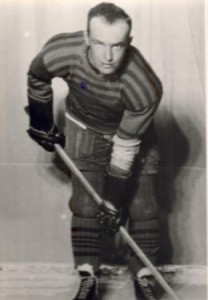 Hockey and Softball are the sports that help place Brit in the Sports Hall of Fame. He played Junior, Senior and Intermediate hockey and was a member of the Collingwood baseball team that won the provincial title, he also donated time to coaching in both sports.
Hockey and Softball are the sports that help place Brit in the Sports Hall of Fame. He played Junior, Senior and Intermediate hockey and was a member of the Collingwood baseball team that won the provincial title, he also donated time to coaching in both sports.
Category Archives: Builder
WILF “SCUTT” BELL
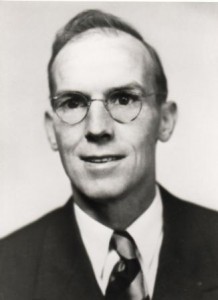 He was born December 11, 1912 in Grandview Manitoba and moved to this area
He was born December 11, 1912 in Grandview Manitoba and moved to this area
at the age of 6. He married S.E. (Nellie) Brock in 1942 and together they raised four children, 2 son, Allan and Jim and two daughters, Betty and Barb.
For several years he was an avid curler and member of the Collingwood Curling Club.
Wilf was the patriarch of softball in Nottawa both as a player or as a coach or as a
manager. He played softball from early school days as a catcher. Few base
runners could beat his peg from the plate to second base, always hit well over
.300 and gave everything he had in every game, even if the game was exhibition.
This trait continued into his coaching/managing career. He was a member of the
ball team of 1925 and was still with them 50 years later.
He started the first outdoor skating rink in Nottawa. Bob Martin and Wilf drew hot
water from Smart’s Cannery on First Street in Collingwood to flood the rink. He shared the dream of having a recreational park with ball lights in Nottawa and this
dream came true in 1969. He was a member of the Nottawa Recreation Committee
who without government grants, worked diligently to realize their dreams.
He was coach of the Nottawa Jardine Midget Club who won the Provincial Championship in 1967; they also won the Blue Mountain Softball title 3 years in a row. That same year the Nottawa Brocks Senior Ball Team won the All Ontario. Most of these players had played under the direction of Wilf in previous years. Therefore a village of 400 boasted two Provincial Championships in one year.
Five members of the 1967 Ontario Midget Championships, Don Gallagher (Collingwood Police Department), Bob Gallagher (Collingwood Police Department), Brad Leno, Les Draper and Dennis Rowbotham (Metro Police Department Mounted Division)became police officers. Jim Bell became a Veterinarian. Wilf also helped to
coach school teams under the direction of Joy Burkholder and Wayne Hartle. In
1977 Wilf coached the Nottawa Daals to the sixth championship in a row.
Wilf started his hockey career in 1960/61 as a manager. He managed teams coached by Dennis Robinson, Harvey Pearen, Cliff Rimmington and Bill Gurney. In 1967 he
managed the Legion Vets, who went on to become All Ontario Finalists, losing to
Leamington in a best of three series. He managed teams on which Paul Shakes and Randy Osburn played, both of whom went on to become NHL players.
Many of the boys managed by Wilf still play hockey today as well as on of his
coaches, Harvey Pearen, who plays on the Beaver Lumber Oldtimers over 45’s.
Wilf’s home was always open to the “young people” and many hours were spent
replaying the “games” until Wilf’s death on April 28, 1984.
EDDIE BUSH
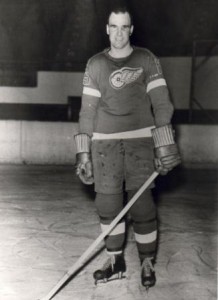 Eddie bush is Collingwood’s most famous hockey export over the past thirty five years
Eddie bush is Collingwood’s most famous hockey export over the past thirty five years
and certainly the most colourful.
Eddie makes the Collingwood Hall of Fame on three counts-as a player, a coach and a
builder.
This brash, flamboyant, swashbuckling competitor came a long way since he made the Collingwood Junior as a kid from the other side of the east end track back in
the hungry thirties.
Bush was a winner right from the start. He hated to lose and he expressed nothing but contempt for anybody who took defeat too lightly.
He qualifies as a builder because it was Bush who revived hockey in Collingwood after it had sunk into the doldrums for more than a decade.
He put this town back on the hockey map in 1951 when he closed off his active pro career to give Collingwood three consecutive Junior “C” provincial titles and a pair of back to back Intermediate “A” championships missing a third one after a great series with the Simcoe Gunners. What a work horse he proved to be in those golden years of Collingwood hockey in 1951-52-53. Coaching the juniors, acting as player-coach with the Shipbuilders and still finding time to impact his great hockey skill and experience to the minor hockey teams from Pee Wee to Juvenile.
He turned professional with Detroit in 1938 and the sporting public knew all about it the first day he arrived in Detroit. Jack Adams was not too shocked with the flamboyance of his introduction because he had been exposed to the Collingwood elements years before with Reg Noble, Sailor Jim Herberts and Bern Brophy.
At any rate he sent Eddie to Pittsburgh and Kansas City for seasoning but he was back in the big time in 1941-42. The big fellow had his best season in 1943 and you will find his name in Stanley Cup records.
In the third game of the Stanley Cup finals the Wings beat the Leafs 5-2 and Eddie helped himself to a goal and four assists. That single game scoring record for a defenseman still stands. Bush looked to be on his way to a brilliant N.H.L. career, but, as in the case of Portland, fate stepped in. Eddie joined the R.C.A.F. and when the war ended thee years later, it was just too late.
His playing career, however, lasted almost ten years more with Cleveland, St. Louis, Philadelphia, Cincinnati, Sherbrooke and finally back in his old home town.
But he continued in the game that has always been his life as a very successful coach at Collingwood, Guelph, Hamilton, Pittsburgh, Memphis, Quebec, Richmond and the Kitchener Rangers. He got back in the N.H.L. as a coach for part of the season with the Kansas City Scouts in 1976.
He was a good football player, better than average ball player and expert at darts and is still pretty nifty with a dollar.
NORMAN BOADWAY
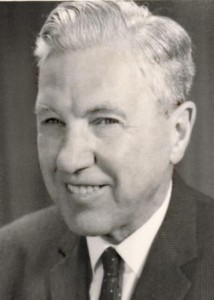 Skiing in the Collingwood area has come a long way since 1935 when a group of public
Skiing in the Collingwood area has come a long way since 1935 when a group of public
spirited citizen had the foresight to see that this winter pastime would some
day put the town and the whole Blue Mountain District on the map.
The whole country was in the depths of the Great Depression when a hundred dollars
looked like a small fortune.
One of the men who realized that there was “Gold in them there, Blue Mountains” was the late Norman Broadway.
He came to Collingwood in 1918 after his discharge from the Royal Canadian Navy,
still recuperating from injuries suffered in the Halifax explosion.
The late John Smart and Norman were driving up from Toronto one Sunday night watching the avalanche of cars speeding back in Toronto from the ski resorts in Huntsville. Norman remarked. “We have bigger and better hills in Collingwood. Why can’t we get in on the action.”
It may have been an “off-the-cuff” remark but it triggered a dream that eventually came true a few years later.
Mr. Smart, who was inducted into the Sports Hall of Fame, in 1978, and cut the Mr.
Boadway, lost no time in exploring the ways and means of getting the ball rolling.
They induced Fritz Loosli, a Swiss pro, to come to Collingwood and cut the first
trails after they negotiated a rental deal for the old Doherty property. An old log cabin was turned into a club house and the Collingwood Ski Club was eventually in business.
Now for a ski tow. The answer came when John David Eaton donated the motor from his wrecked Chrysler. The motor powered a wooden sleigh tow and the sleighs ere
built by the late Robert Morrill. The seats were built in Boadway’s cellar. During the first winter, Norman operated the motor and John sold tow tickets. The tickets sold for ten cents each.
Through his connections as manager of the Collingwood Terminals Ltd. elevator, Norman got Senator Peter Campbell and Gordon Leitch, a pair of big time financers, interested in the development. The rest is history. The development of the ski trails was not the only cause pioneered by Norman Boadway.
He was the driving force behind the birth of the Blue Mountain Crippled Children’s
Camp and the first Collingwood Yacht Club and the founding of the H.M.S. “Hood” through the Collingwood Branch of the Navy League. He helped organize the Collingwood Horticultural Society and served for many years on the General and Marine Hospital Board.
His interest in curling included the donation of the Collingwood Terminals Cup in
the late thirties. Norman Boadway died in October, 1965, in his 67th year.
FRED BROCK SR.
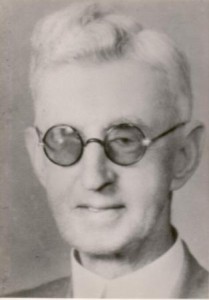 This man was a driving force in having a referendum for the building of the Collingwood Community Arena in 1948.
This man was a driving force in having a referendum for the building of the Collingwood Community Arena in 1948.
He is placed in the Builders’ Category of the Hall, but was also a fine athlete. He was a long-distance runner and a swimmer in his younger days.
Mr. Brock helped form Collingwood’s Junior and Senior hockey leagues in the
1930’s, donating the trophies. He also organized Collingwood’s first swim meet.
